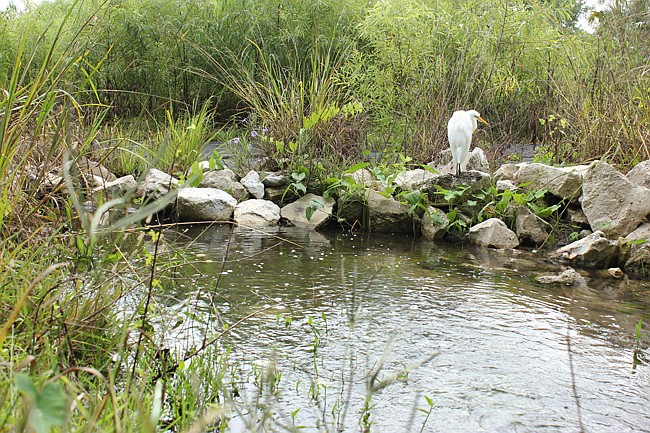- April 20, 2024
-
-
Loading

Loading

A restoration project for the Lake Lillian Wetlands at Mead Botanical Garden could bring new life to the dark, murky habitat – an effort that could eliminate other wildlife and vegetation in the process.
Mead Botanical Garden Inc. and the city of Winter Park hope to revitalize a piece of wetlands right beside the outdoor pavilion in Winter Park’s botanical haven. The half-acre section of wetlands will be dredged and revitalized into a new lake, creating a serene background behind the amphitheater.
But the real benefit will be the boost of wildlife in the area, said Cynthia Hasenau, executive director for Mead Botanical Garden Inc.
Digging out the muck and sediment from beneath the murky water would cut off the source of algal blooms. Turbidity barriers placed along the edges of the lake would stop the spread of more sediment, holding back contaminated water.
“The project ultimately would improve the wildlife habitat there in that wetland, as well as create some areas of open water,” Hasenau said.
“It would reduce the amount of invasive species out there and create a much more viable habitat.”
The wetland dredging represents the newest chapter in a park restoration effort spanning more than a decade. Mead Garden originally opened in 1940, but fell into disrepair and neglect by 1953.
Winter Park staff maintained the park by emptying trashcans and mowing lawns in the decades that followed, but the greenhouses suffered from vandalism while plants overgrew.
Concerned Winter Park residents formed the Friends of Mead Garden in 2003, hoping to restore the park to its former glory.
Four years straight of landscaping and pulling weeds eventually turned the garden into a destination.
Mead Garden received a $40,000 grant for the wetland project in 2012, a jumping-off point awarded to them by the Florida Fish and Wildlife Conservation Commission.
But changing the habitat could mean potential disaster for some existing plants and animals in the wetlands, said Judy Benson, chairwoman of the Seminole Soil and Water Conservation District.
Wildlife dwelling in the wetlands have likely adapted to the current conditions, Benson said. Construction runoff could harm most animals, while changing water levels could kill off vegetation.
Creatures living in the scooped up sediment below would be vulnerable as well, she said.
“When they dredge, they’re removing soil which has life in it,” Benson said. “Who knows what lives in and around those soils.”
“Whenever we change something, even if it’s for the positive, it’s going to change something currently.”
Hasenau clarified that any work in the Lake Lillian wetlands would have to be approved by both the St. John's Water Management District and orange County Environmental Protection Division first before moving ahead, and that a current application for that approval is pending.
She said that the project's effects have been investigated by wetlands biologist Mark Ausley and Florida Fish and Wildlife Commission representatives to ensure an environmentally sound project.
The half-acre slice of wetlands just behind the pavilion might only be the start of a widespread muck-removal, Hasenau said. Officials from Mead Botanical Garden Inc. are discussing a project to dredge all the surrounding wetlands, she said.
“We are looking to do a much more extensive restoration in that wetlands area than what that Florida Fish and Wildlife grant will fund,” Hasenau said.
“Ultimately it could be a multi-million dollar project to restore the entire wetlands.”
Members of the Winter Park Lakes and Waterways Advisory Board expressed concerns of their own over the project at their March 19 meeting.
Board Chairman Jesse Graham said legal issues could arise if the Environmental Protection Agency could somehow deem the wetlands were altered incorrectly. Graham cited an incident earlier this year that involved Wyoming resident Andy Johnson, who built a pond on his 8-acre farm and chose not to cooperate after receiving a cease and desist order from the EPA, as reported by FoxNews.com.
The welder claimed he faces a potential fine of $75,000-per-day until he removes the pond, the report read. The EPA said he violated the Clean Water Act, allowing material from his pond to discharge into waterways. The article cites rising concerns over how the EPA is choosing to enforce the Clean Water Act when it comes to everything from private ponds to public wetlands.
“It’s kind of scary,” Graham said, “because the feds won’t back off.”
Mead Botanical Garden Inc. is looking to Congressman John Mica for additional funding from the federal level, while the city continues to pursue additional funding from the state, Hasenau said.
Mead Garden’s wetland project still awaits approval and permitting from the St. John’s River Water Management District. Hasenau said the group plans to start tapping into its $40,000 grant by early this summer if given the green light to move forward.